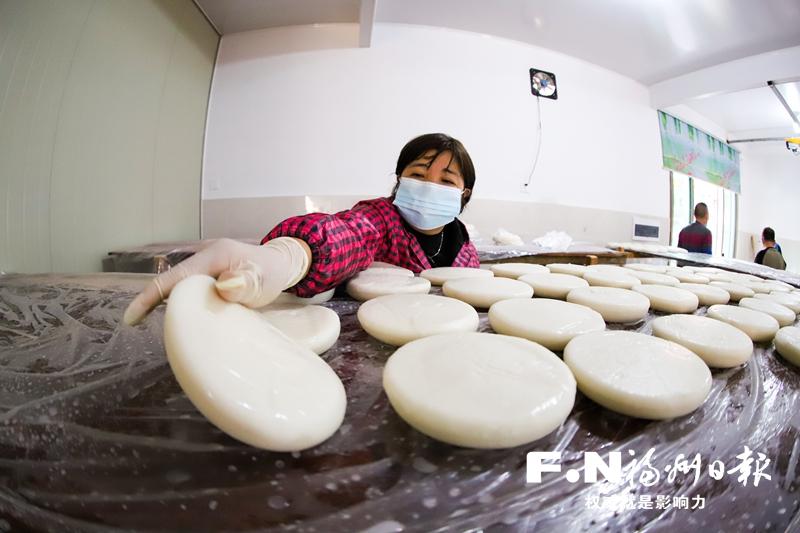“Fuzhou Flavors” Go Global to Ease Homesickness
“No matter where you are, what you enjoy is nothing more than a simple meal that carries the essence of everyday life.”For many Fuzhou locals, dishes like mee sua noodles, pork wontons, and white rice cakes are must-haves on the dining table during the Spring Festival. According to reports, these “Fuzhou flavors” have recently seen booming production and sales, reaching markets overseas.
Mee sua noodles, also known as Taiping noodles or longevity noodles, symbolize peace and long life, making them a must-have for Fuzhou locals during festive occasions. Recently, Danyang mee sua noodles, made using century-old traditional techniques, have seen a significant boost in sales. Every day, the production factory begins operations at the crack of dawn.On January 27, the reporter visited Fujian Xinxiang Foods Co., Ltd. in Xinyang Village, Danyang Town, Lianjiang County. Inside the bright and clean production workshop, workers were busy operating modern equipment to produce noodles.

Workerswere busymaking Renshan white rice cakes. (Photo courtesy of LianRongmei)
“It’s in high demand! Over a hundred workers are working overtime every day to ramp up production,” said Lin Guifang, head of Xinxiang Foods. Recently, the factory has been producing around five tons of mee sua noodles every day, which are sold nationwide and exported in large quantities to the U.S., Canada, and beyond. These noodles allow overseas Chinese to enjoy the authentic flavors of their hometown, alleviating their homesickness.
In addition to mee sua noodles, pork wontons are also an essential dish for Fuzhou people’s New Year’s Eve dinner. As the saying goes, “No wonton, no feast; no wonton, no New Year.” Pork wontons, named for their resemblance to flying swallows, symbolize the arrival of happiness and peace in every home.
Danyang Town boasts a pork wonton culture that spans over 400 years. While pork wontons may appear simple at first glance, resembling ordinary wontons, a single bite reveals their rich and surprising flavor. “Both the wrapperand the filling of the pork wonton are made entirely of meat. Thatis why they’re also called ‘meat wrapped in meat.’ The wrapperis made from fresh pork hind legs, selected for their high lean meat content. After removing the skin, tendons, and membranes, the meat is repeatedly pounded to achieve the ideal texture. The filling is made from a carefully balanced blend of fatty and lean pork,” explained Lin Guifang.
With technological advancements, some of the production processes for mee sua noodles and pork wontons have been automated. This not only ensures better control of temperature and humidity but also creates a more standardized and hygienic environment, allowing for stable production throughout the year. According to Lin Guifang,in recent years, the company has introduced pre-packaged products, which are sold through both online and offline channels, reaching markets across the country and overseas, bringing this local delicacy to a wider audience.
White rice cakes are a traditional Fuzhou delicacy, symbolizing unity and prosperity. The cakes are often adorned with patterns such as the Chinese charactersof “Fu”and “Shou,” representinglongevity,reunionandhappiness. Among them, the Renshan white rice cakes from Pandu Town in Lianjiang, with their long-standing history, are renowned far and wide.
On January 27, the reporter visited a white rice cake factory in Renshan Village. As soon as she stepped into the workshop, she was greeted by the rich, enticing aroma of freshly steamed rice. Inside, workers were busy doing their work- mixing, steaming, kneading, and shaping- in a smooth and orderly manner. Before long, trays of soft, subtly sweet, and pleasantly chewy white rice cakes were freshly made.
While rice cake production ran smoothly, sales were booming as eager customers flocked to make their purchases, drawn by theirgrowing fame.“It brings back the taste of my childhood, and I can vividly recall the moments of making white rice cakes with my parents and siblings,”Mr. Chen, who drovefrom downtown Fuzhou every year to buy the rice cakes, said nostalgically.“Without white rice cakes, it doesn’t feel like a complete Spring Festival celebration.”(Fuzhou Daily Reporter: Lin Wenjing; Correspondents: Chen Chengzhi, Lin Qiaoqian)